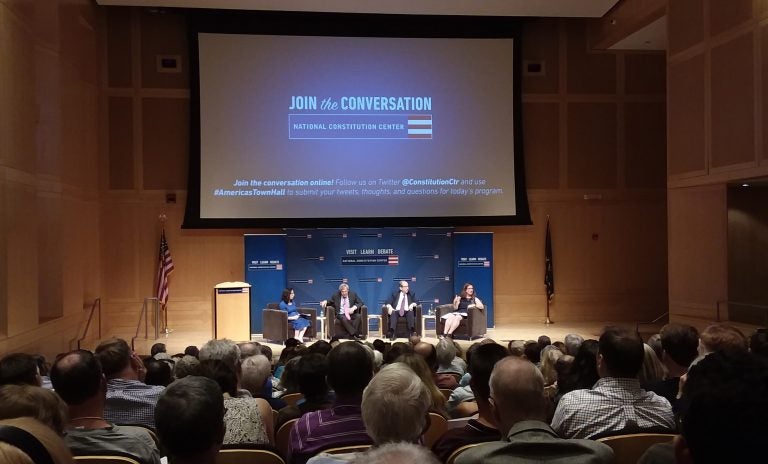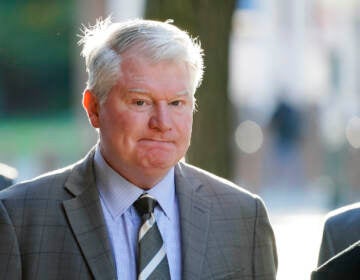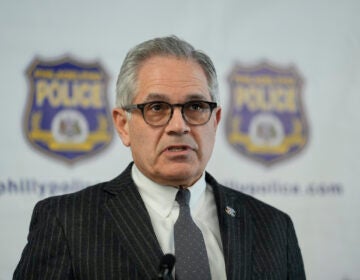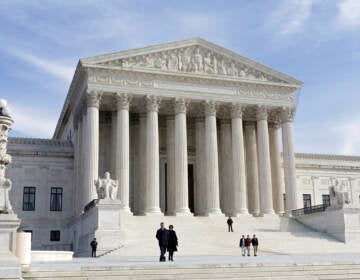Looking back over year of rulings — and ahead to new edition of Supreme Court
Panelists at the National Constitution Center Annual Supreme Court Review analyzed the court’s 2017-2018 term for hints on what to expect when the new session begins

Panelists at the National Constitution Center Annual Supreme Court Review discussed and analyzed the court’s 2017-2018 term Tuesday in Philadelphia. (Maya Aphornsuvan/ for WHYY)
As the nation prepares to move into a new Supreme Court era following the retirement of Justice Anthony Kennedy, panelists at the National Constitution Center Annual Supreme Court Review discussed and analyzed the court’s 2017-2018 term for hints on what to expect beginning the first Monday in October.
The panel convened, by chance, the day after President Donald Donald Trump nominated Judge Brett Kavanaugh to fill the looming vacancy.
Losing the swing vote?
Many have expressed concern about losing the court’s swing vote as Kennedy prepares to retire at the end of the month.
But Erwin Chemerinsky, dean of Berkeley School of Law, said the swing vote has already disappeared. In the just-concluded term, 18 cases were decided with 5-4 votes. In 13 of these cases, Kennedy sided with the conservative justices — but never with the liberal justices in the other 5-4 decisions.
On the other hand, just a year ago, Kennedy joined the liberal justices on their opinions 57 percent of the time.
A new Supreme Court era without a swing justice, Chemerinsky said, is underway and will continue.
“If you are a conservative, this is the time to celebrate,” he said.
Understanding on what issues Kennedy “defected and voted with the left” is important, because those matters are likely to come up again, said Slate editor Dahlia Lithwick. Cases involving affirmative action, LGBTQ rights, and incarcerated juveniles, she said, are some of them.
The travel ban
The panelists also addresses some of the major cases heard by the court cases this past year, including the travel ban matter.
“The third version of the travel ban was the one that was most sanitized. It was not all Muslim-majority countries, and not only Muslim-majority countries,” said Frederick Lawrence, secretary and CEO of Phi Beta Kappa Society.
The majority looked at the case and did not see discrimination toward any religious group, Lawrence explained. Justice Sonia Sotomayor strongly disagreed, writing that simply looking at the purpose of the ban itself is not enough in deciding that it was not a ban on Muslims. The Trump administration had previously used the term “Muslim ban,” she wrote, which describes what it truly is.
Questioning Kavanaugh
As the country prepares for the confirmation process, Chemerinsky said it will be vital for lawmakers to press Kavanaugh for answers on his views and opinions.
“There is nothing in the Constitution or any law that says the nominee can refuse to answer questions,” he said.
Some may argue that a justice’s opinions do not matter, but Chemerinsky said life experiences and beliefs have a tremendous impact on a jurist’s decisions.
Will the Senate press him for answers? Lawrence said it’s not likely.
“You can, in fact, pressure your senators to ask the questions they should ask, but the most important arithmetic in that room is 51-49,” he said referring to the GOP edge in the Senate.
WHYY is your source for fact-based, in-depth journalism and information. As a nonprofit organization, we rely on financial support from readers like you. Please give today.





